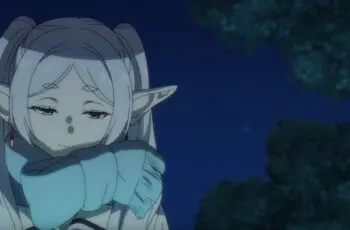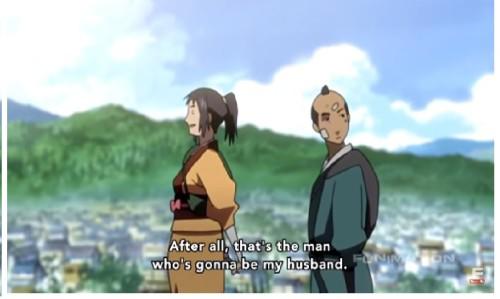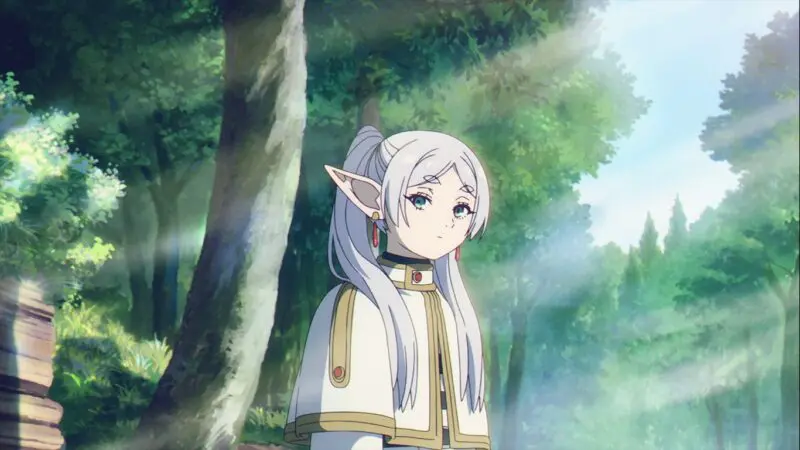
Because of her long lifespan, Frieren not only have a different view of time, much to the concern of her adopted human daughter Fern, but she also struggles with apathy and connection. Frieren cannot easily connect to humans because they die too fast, paraphrasing one of her lines. She struggles with a form of nihilism that her time with Himmel punctures. She realizes how vital short human lives can be, yet across her immense life, a single human life like Himmel or Fern will end up buried amidst all the other lives she would meet. Her apathy manifests in disregard for simple things like sunsets–she will see thousands of them across her 10,000+ year life. She often treats days and weeks as we treat minutes–as throw away. Yet, she can obsess over something as small as a flower and spends months searching for it. The tiny, simple things she focuses upon connect to Himmel and stand as a piece of humanity, which is why she obsesses over these pieces while disregarding sunrises and sunsets. Frieren’s relationship with Fern provides some structure and a better, albeit slightly, sense of time. She begins to worry about the pieces that link her to Fern as well.
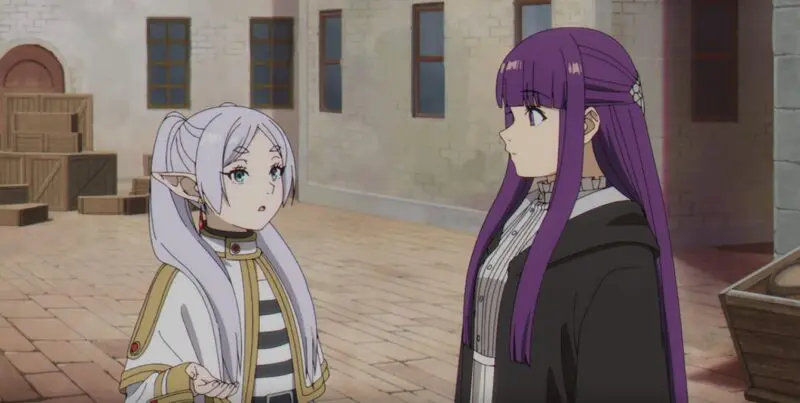
Frieren becomes a living memory archive, and she realizes that, at some point, only she will remember Himmel just as only she remembers her human magic teacher Flamme for who Flamme really was. Himmel, in a scant 30 years, has already faded from memory, becoming the Hero, a statue and a legend rather than a real person. In one scene, Frieren encounters an even older statute depicting two heroes, a hero and an elf, that not even she remembers. Their statue, just as Himmel’s statues, are remembered as some ancient hero whose deeds are forgotten. The problem of memory pervades the story. As humans die, memory distorts, losing its immediate meaning, and fading into legend. When the people who knew the hero die, direct connections to the hero’s personality sever, leaving only second-hand stories. As the children of those who told the stories die, memory becomes third-hand stories that have, no doubt, changed. Frieren sometimes contrasts the fading of the grand hero memory against the fading of the memory of the common folk. She remembers grandmothers and great-grandfathers, even if she had met them in passing, better than grandchild and great-grandchildren. The story doesn’t make a big deal of this; these scenes pass but offer profound commentary about memory. Few, so few, people will be remembered. Fewer still will be remembered for who they were, and even then no one will entirely know their personality. Most of us, as Frieren quietly points toward, are fated to be forgotten dust. We will leave a mark, a slight mark but a mark nonetheless, but we will be forgotten. As Frieren also points out, given enough time even the most famous, most powerful, most known people will be forgotten, leaving a statue commemorating what history has forgotten.
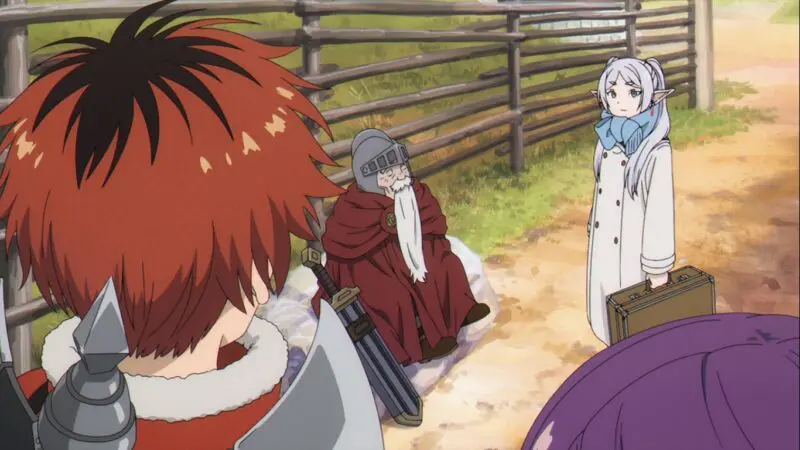
At one point, Frieren and friends visit a centuries-old dwarf, Voll who continues to protect his human wife’s village. Voll, despite his love for his wife, no longer remembers her face because of all the centuries that have passed since her death. Even among the long-lived, memories can fade almost of the point of disappearing. And once Voll passes, his wife will be forgotten too. This theme of death and memory keeps reappearing in various ways throughout the story. The theme contrasts against the humor and the slice-of-life moments. Death makes these moments more important, as Fern often shows in her own way. The juxtaposition of humor with death–forgetting is just another form of death–emphasizes both. Without death, you cannot appreciate life, as Frieren shows with her apathy. She gains appreciation for small life events through the perspectives of her human friends and family–Himmel and Fern in particular. Frieren sometimes comments about how repetitive events like dawns, dusks, festivals, and other things stop having meaning because of their lack of rarity. Once she takes Fern’s perspective, however, she realizes these events are ultimately scarce. Without the perspective of death, she takes a lot for granted. She gives her best effort because she knows her weaknesses. She understands she can’t read the air, that is, read the social context. She often makes Fern angry through her emotional ineptitude. Heiter even warns Fern to be patient with Frieren. Frieren will socially fail Fern and others, but Frieren will eventually see this error and try to fix the mistake. That’s all any of us can do.
In this way, Frieren stands in for us. We too take much of life for granted. We aren’t aware of death when we ought to be. Death feels far off–not as far off as with Frieren–but far off nonetheless. We don’t appreciate minutes or hours or even days, squandering them on pursuits that are even less fruitless than Frieren’s several-month obsession with a flower. We chase money for decades. We don’t think about how we will be forgotten soon after we die. After all, if even heroes fade from memory, becoming just a name associated with a legend which eventually disappears into time, average people like us disappear immediately. Despite the heaviness of this fact, Frieren doesn’t fall into nihilism. Life is worth living because it is fleeting. Frieren notes how intense humans live compared to her, squeezing more into their decades than she does, because their lives are fleeting. Life is an ends, not a means. Frieren‘s emphasis on forgetting undermines the usual view of life: a heroic life aims at a means beyond itself that leads to fame that borders on immortality. But even a hero, given enough centuries, becomes forgotten. Even the hero’s achievements become undone. Himmel defeats the Demon King, but other heroes defeated similar challenges only to be forgotten and their peace broken. Ends like fame and peace, while sometimes laudable, are impermanent. Life within the moment, however, stands as the final end; final in once a moment passes, it’s gone. Using that moment as a means to an end disregards the value of that moment and its scarcity. Even someone as long-lived as Frieren has moments that are scarce against the long span of time existence itself inhabits. Yet, to a degree we can’t avoid using our scarce life as a means to an end: survival. Survival in the modern world means money. We trade our moments for money just to survive for more moments to use to chase more money, and so on until we die. Frieren doesn’t delve into this dystopic, modern problem, but the story points toward the solution: realizing death while alive.
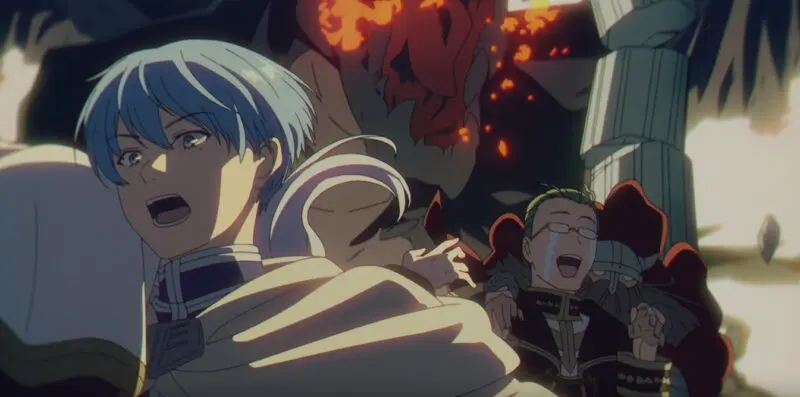
Frieren’s apathy and laziness captures our modern habit of apathy and laziness. We cover ours with busyness and entertainment. Frieren leaves her apathy and laziness exposed. Who is more honest? We insulate ourselves from our own fear of being forgotten by losing ourselves in work or video games or movies or social media or the many other entertainment options. In the moment, we don’t have to face the reality of our short lives, which feel long in the moment, but are gone like sunlit frost. Frieren, however, is aware of this fault. When she cares about the people she misreads, she makes amends. She knows she can’t remember small events; she remembers lives and critical events. Fern keeps Frieren on schedule and keeps her chained to an appreciation with time. So too we need someone or something to keep us walking, thinking, learning, and appreciating each moment. Entertainment, done mindfully, is well and good. If done out of habit and lack of appreciation, entertainment kills. Do you have a Fern? Someone who will hold you accountable and keep you from losing yourself to entertainment, sleep, or apathy? That someone can be a philosophy or religion, but better to have a person who can do this. When you walk alone, it’s easy to become discouraged, to fall prey to the problem of means, and to get too tired to resist the lure of modern entertainment. Find someone who can act like Fern and be Fern for that person too.
Despite Frieren’s apathy, she gets excited over mundane spells and books. She lights up when she encounters a magic bookstore. Like with a flower or a bird, Frieren gets more excited about something small than the grand experiences Fern and her other human companions focus upon. Her favorite spell creates a field of flowers. She loves the humble, the mundane. A spell that cleans clothes stands as more legendary than one that would summon a dragon. Frieren seeks to show us how the mundane is magical and full of wonder. The mundane is worth getting excited about. A book about flowers is worth getting excited about.
Frieren’s mix of apathy and intense interest provides not only a good contrast in her character, making her an even more interesting character, but also offers an insight that we ought to reflect on. As Michael Singer writes in his book The Untethered Soul concerning death:
If you challenge yourself to live as though it were your last week, your mind may come up with all kinds of suppressed desires. It may start talking about all things that you’ve always wanted to do, and you may think you had better go do them. You will soon see that’s not the answer. You have to understand that it is your attempt to get special experiences from life that makes you miss the actual experience of life. Life is not some thing you get: it’s something you experience. Life exits with or without you. It has been going on for billions of years. You simply get the honor of seeing a tiny slice of it. If you’re busy to get something, you will miss the slice you’re actually experiencing. Every one of life’s experiences is different, and every experience is worth having. Life is not something to waste. It’s truly precious. That’s why death is such a great teacher. It is death that makes life precious.
When Frieren becomes so obsessed with something that she stays put for months or even years chasing that something–be it a flower or a book, she’s experiencing life as Singer suggests all of us should. Life happens regardless of how well you pay attention. In the story, Frieren stands as a contradiction. She doesn’t live as intensely has her human friends, living slowly and with apathy, yet she also lives deeper than her human friends with her ability to stop and go deep into something tiny that few see a value in pursuing. Yet, she disregards other life-affirming things, like watching a sunset with Himmel and gang during a festival or otherwise spending time with her adopted human family. Frieren forgets the lessons death teaches only to be reminded of those lessons along her new journey. Likewise, we forget the lessons death teaches us, looking toward the grand events while missing the life of everyday. We collect experiences like trophies, forgetting the “grind” of work and normal living is where life happens. Life happens now. Life isn’t a performance to impress others. Himmel didn’t help others because he wanted statues. He helped to help. Although he didn’t turn down a statue either!
Frieren:Beyond Journey’s End, despite the presence of death throughout its story, remains lighthearted and hopeful. It remains lighthearted and hopeful because of presence of death and forgetting. Without that contrast, the story wouldn’t reach the heights it does. Frieren teems with thematic depth. Frieren offers a lot to reflect on without overdoing it as so many stories can. It’s not heavy handed despite how I’ve discussed the story’s main theme. Frieren is a joy of contrast, punctuated with moments of silence to provide some space to reflect and laugh. Hope saturates the episodes. The story might be too slow for some people. What action scenes the story has stand stronger because of the slow slice-of-life around them. When action explodes on screen it’s a wonder of traditional animation. Frieren offers a thoughtful study of death and life, forgetting and remembering, apathy and appreciation, distance and closeness.
References
Singer, Michael (2007) The Untethered Soul. New Harbinger Publications and Noetic Books.
